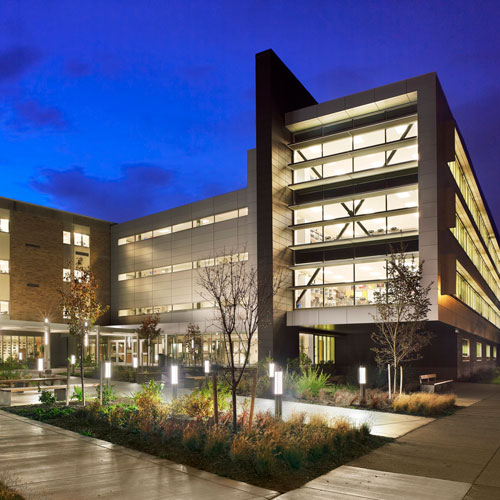Jeff Linscott graduated from college with plans to attend law school, but a fraternity brother’s father was in desperate need of a project manager at his contracting business, so Linscott put his legal studies on hold and took the position. In doing so, he found a career he loved at RF Fisher Electric Company LLC, which provides a full range of electrical services in the Kansas City metropolitan area. Today, as the business’s executive vice president, Linscott manages all its operations, overseeing estimating, project management, and job-site labor to ensure the accurate and timely delivery of each of its projects. He took some time out of his day to offer some career advice, detail his industry, and show off RF Fisher’s latest projects.
_______________________________________________________________________

Project spotlight: cinetopia
Recently, RF Fisher won a competitive bid to handle the electrical work for Cinetopia, an Overland Park, Kansas, movie theater with a number of unique features. The 75,000-square-foot cineplex caters to families with a full restaurant and bar for adults and a family room featuring video games and food service. “It’s a destination,” Linscott says—one that presented a number of challenges.
The firm was responsible for the coordination and installation of audio-visual, lighting, voice, data, and kitchen finishes—“heavy electrical with a lot of intricate finishes,” Linscott says. The majority of the light fixtures, for example, had dimming or other controls attached to them, and the high ceilings in some of the theaters—a few of them two and a half stories above the ground—required point-on accuracy. “We had to work with the other trades to access shared scaffolding, and the job had to be done right the first time because when the scaffolding was out, it was out,” Linscott says. There was also a time crunch: the $2.75 million job had to be completed in five months, which required RF Fisher to work both day and night shifts.

_______________________________________________________________________
Preparing for New Technologies
Linscott offers his views on a few of the innovations influencing his industry.
Career Climb
Here’s the route Linscott took to get where he is today.
1998-2002
Project manager for RF Fisher
2002-2005
Senior project manager for RF Fisher
2005-2011
VP of construction services for RF Fisher
2011-2013
Global projects leader for General Electric Transportation
2013-Present
VP of operations for RF Fisher
Paperless design
Many contractors are trying to replace blueprints with computer interfaces, but Linscott doesn’t think the transition will take complete hold. “There’s a limit to where the technology can go in that regard,” he says.
LED lighting
Linscott does see energy-efficient technologies becoming more commonplace. For example, in three to five years, he believes, almost all fluorescent and incandescent lighting will have been replaced with LED lighting.
Intelligent control systems
Another energy saver, Linscott says, these systems will manage power for offices down to the smallest item.
“Phantom power”
This is the term for the energy drawn by plugged-in but unused electronic devices. It’s a problem that will need to be addressed soon, according to Linscott. “As energy codes become more demanding, modifications will be necessary,” he says.
Mobility
This is one change that Linscott doesn’t care for. “Mobile devices have had unintended consequences on our business, like most others,” he says. “There used to be an eight- or 10-hour window when work happened, then everyone stepped away from the office. Now you have your phone in your hand to respond to e-mails, which moves projects forward 24-7.”
_______________________________________________________________________
Jeff Linscott’s Words of Wisdom
I didn’t have a construction background. When I first started, I did some time in the field, working under a field superintendant, before moving into the office, putting estimates together.
You have to do the simple things well to succeed in this industry. Read, write, comprehend, communicate your proposals and solutions thoroughly. And attention to detail is paramount.
People have the most trouble with the ebb and flow of the work. At times, you’re buried. Then you’re slow. It’s tough to manage the constant change in workload and continue to be efficient and focused.
The job affords you the opportunity to do something new every day. You’re not just coming in and counting light fixtures. You’re evaluating schedules, writing proposals, and attempting to solve problems in collaboration with the field personnel.
Don’t let anything hold you back. Regardless of the industry, if you want to learn, you can do pretty much anything. I have a liberal arts degree in history and have found success in an engineering discipline.
_______________________________________________________________________

Project spotlight: freightquote
RF Fisher’s acquisition of the Kansas City Freightquote project—the design-build construction of a 200,000-square-foot core-shell and tenant-finish office for an Internet-based transportation company—stemmed in great part from its knowledge of office construction. “It was a proposal-based project, meaning we received a simple narrative and had to fill in the blanks to put together a written proposal that detailed all aspects of the project,” Linscott says. “It’s weighted heavily on one’s knowledge of the entire building process, and since we do quite a bit of office-tenant finishes work, we were chosen.”
The project’s challenges included power—the building had three 750-kilowatt generators and redundant data feeds—and timing. Construction began in January, a particularly bad month for a job in the Midwest, and had to be completed in four months, which was difficult, given its size. RF Fisher again met the timeline by working both day and night shifts. Doing so was particularly important given the so-called “stacking of trades” of different subcontractors working at the same time. “When you have a lot of trades, you end up working on top of each other, and productivity suffers,” Linscott says. “By getting in at night, when the framers and drywall contractors weren’t working, our productivity increased.”


